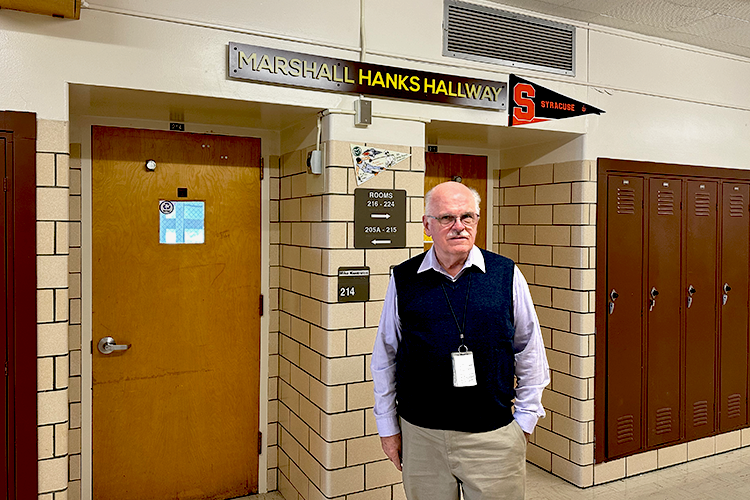
Hanks is a legend of the Thomas Jefferson community and is deeply rooted into student education, having a hallway named after him. photo by Farah Djama
A 57-year Denver Public Schools veteran shares his unique view on technology.
Marshall Hanks is a veteran of the Thomas Jefferson community and DPS school system. Over the span of 57 years spent teaching, Hanks has seen a tremendous amount of change and an incredible shift of the educational environment both in and outside of the Thomas Jefferson community. Not only have the ways of teaching changed, but so have the material and how it is taught.
Currently, society is at a point in time where there is new technology and groundbreaking advancements nearly every day. It’s very similar to the point in time where technology itself was being introduced into the classroom and education system. Of course, this new technology includes Artificial Intelligence (AI), and Hanks has a very unique way of relating this to education as he’s lived through and experienced the rise of technology while being a teacher.
Hanks started off as a Science teacher first, teaching large classrooms as a regular teacher. After his retirement he shifted into the half time position of a Tech Support here at TJ, which is what he does now. Off the bat, Hanks made it clear that technology has always been an interest for him. Here at TJ, Hanks works with tech every day. “Tech support basically involves almost anything that plugs in, so it’s computers, printers, screen projectors, interactive boards. I also assign room keys, so I do a pretty wide range of things,” explained Hanks.
Starting at TJ in 1982, this is Hank’s 42nd year working in the school. Before that, he was at Byers Junior High for 15 years, which in total is 57 years in the district. When Hanks first started working in the district, he recalled that there was no technology or computers, only IBMs and Big Blues. Receiving his first computer in 1980 at Buyers, Hanks started to see the first integration of technology into the classroom. Upon technology’s arrival, it was very helpful, and Hanks said that, “[he] used it mostly for a grading program and it was really useful.”
It’s difficult to imagine a school with no technology, especially for those who have never seen a classroom without it. Technology is so heavily integrated and relied upon in the classroom and in daily life; suddenly removing it would be disastrous. The entire school system would likely not work, and teachers wouldn’t know where to start fixing the problem.
Hanks believes that technology is mainly beneficial, stating that it has made the quality of the work that the teachers give to the students significantly better and has also improved the quality of work that the teachers receive. Through the integration of technology, many issues have been ironed out, such as bad handwriting and formatting issues that are prevalent in paper assignments.
However, as with anything new, there were many downsides and problems that came along with it. Hanks feels that technology has made it too easy to gain information and has also caused a shift in the learning environment and the attitudes surrounding it. Over time, Hanks has noticed that students nowadays are a lot less motivated and are less focused on learning, instead relying on just getting a grade by putting out information regardless of whether it’s something that they truly understand.
Technology has also made learning more confusing because there are many instances of false or out-of-context information online, leading to many instances of misinformation. The true benefits of technology lie in the hands of the one using it, as it has the capability to give access to such an immense library of information. When technology like google and other systems like ChatGPT are used correctly and efficiently, it is one of, if not the most, beneficial tool to aid in learning.
Hanks has always been interested in technology and likely would have gone fully into the industry had the opportunity shown itself while in college. Hanks has always seen technology becoming a powerful tool ever since its beginnings, but it was difficult to imagine it coming to the true size and importance that it is now. Artificial Intelligence has been growing tremendously recently, especially with the release of programs like ChatGPT. Hanks sees many similarities between the way that society and educators view this new technology. “That two-way, extremely split mentality has been here since day one. We have teachers who, every year, are scared to death of technology and can’t figure out how to turn the devices on. Then, on the other hand, there’s always the teacher who wants more of it, more of it, more of it. The ‘I want the latest. I don’t care what it is, I want more of it.’ Nowadays, a lot of that anxiety is alleviated among younger teachers because they’ve been with computers all their life,” explained Hanks. There is a very split mindset when it comes to technology and new groundbreaking innovations like AI. ChatGPT’s release last year sent school systems into havoc with students copying and pasting full essays that were fully created through the program.
Hanks believes technology is already so heavily integrated into our lives that it would be impossible to try and reject pieces of it such as AI. Instead, if teachers go to the effort to try and incorporate it into the lessons and activities, it can be used as an extremely beneficial tool. By embracing AI and using it instead of pushing away and trying to eliminate it, one can unlock a useful database and tool. Hanks’s view on new technology is a beneficial resource – he has seen the rise of technology as a whole, and by learning from educated people such as Hanks, students are better able to utilize technology and form their own educated opinions.